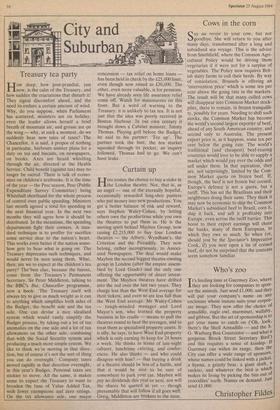Cows in the corn
Say au revoir to your cow, but not goodbye. She will return to you after many days, transformed after a long and subsidised sea voyage. This is the advice from Smithfield, where the Common Agri- ! cultural Policy would be driving them I vegetarian if it were not for a surplus of vegetables. The Policy now requires Brit- ish dairy farms to cull their herds. By way of consolation, Brussels is offering an 'intervention price' which is some ten per cent above the going rate in the markets. The result will be that many culled cows will disappear into Common Market stock- piles, there to remain, in frozen tranquilli- ty, possibly for years. Needing to shift such stocks, the Common Market has become the world's second largest exporter of beef, ahead of any South American country, and second only to Australia. The present export price is, as it happens, some ten per cent below the going rate. The world's traditional (and cheapest) beef-rearing countries would love to be able to supply a market which would pay over the odds and sell under them. In that aspiration, they are, not surprisingly, limited by the Com- mon Market quota on frozen beef. If, though, the beef is not frozen but corned, Europe's defence is not a quota, but a tariff. This has set the Brazilians and their neighbours doing their sums. They think it may now be economic to ship the Common Market's subsidised beef to Brazil, corn it, ship it back, and sell it profitably into Europe, even across the tariff barrier. This boost to their export earnings will cheer the banks, many of them European, to which they owe so much. So when (or, should you be the Spectator's Imperative Cook, if) you next open a tin of corned beef, do not be surprised that the contents seem somehow familiar.






































 Previous page
Previous page